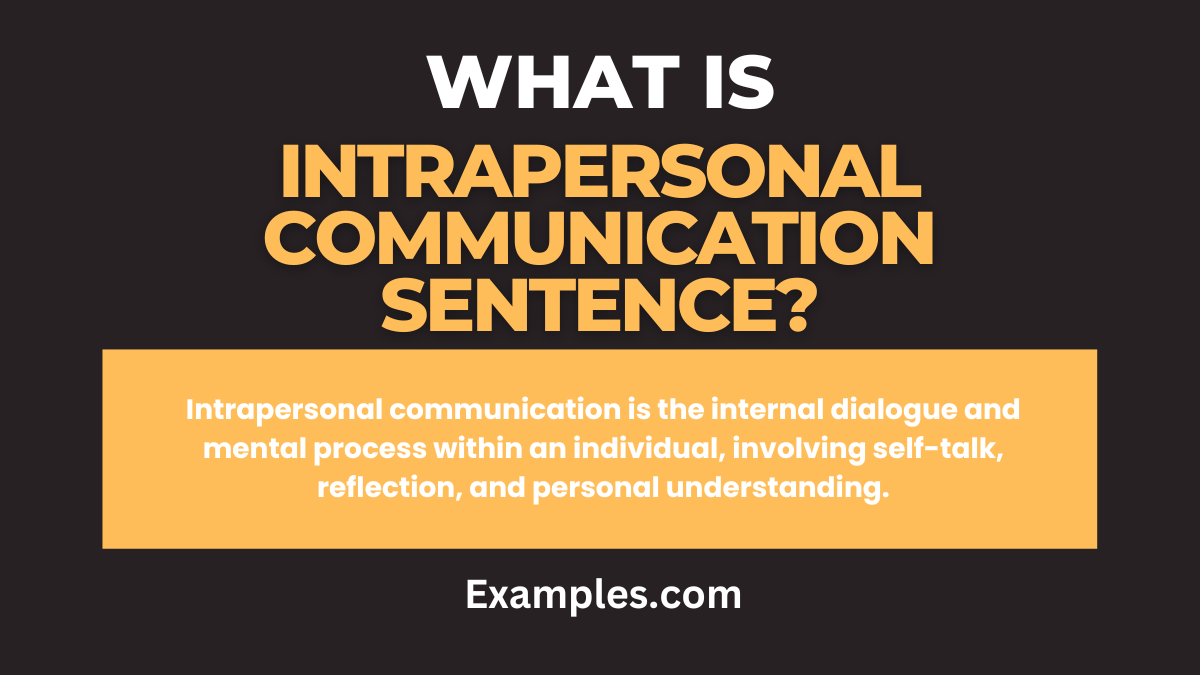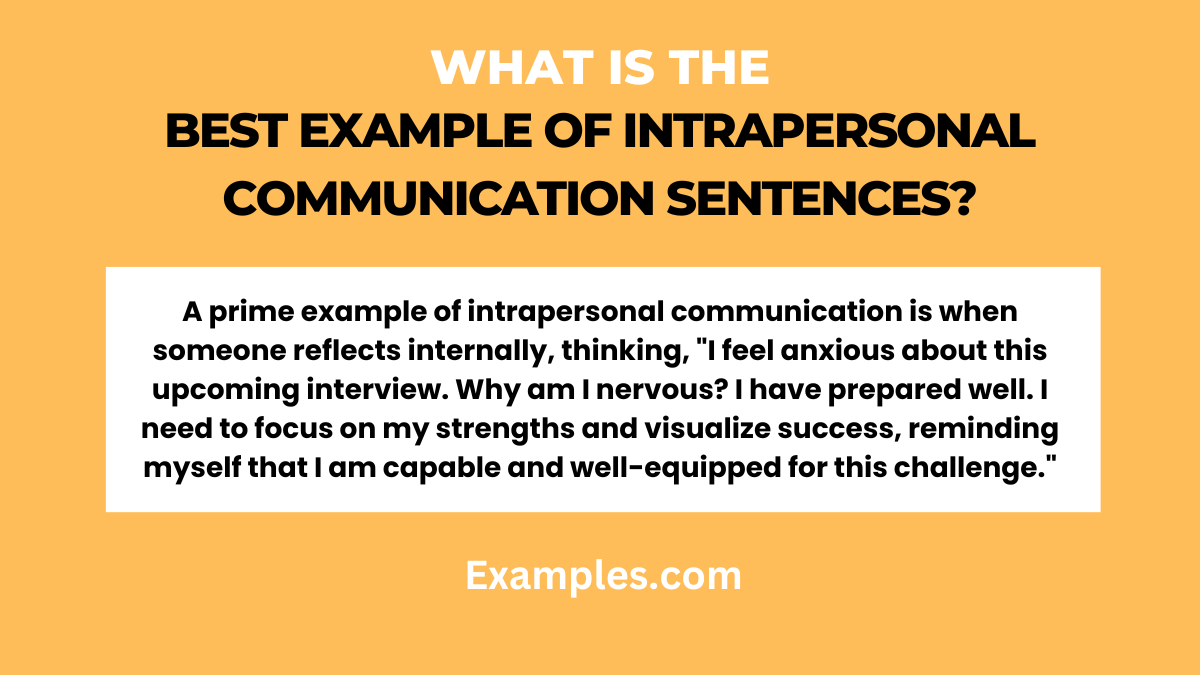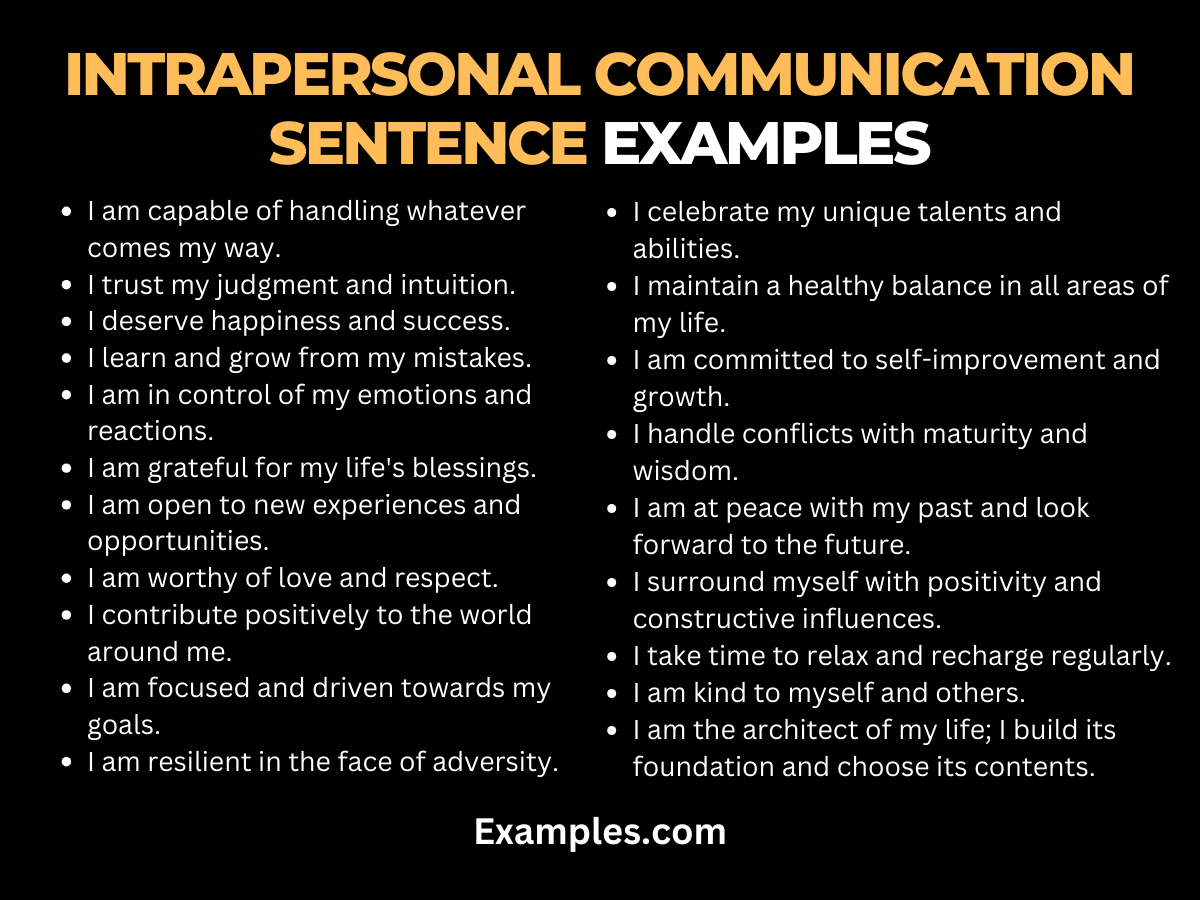19+ Intrapersonal Communication Sentence Examples
Unlock the secrets of your inner world with our complete guide on Intrapersonal Communication Sentences. This detailed exploration delves into the nuances of self-talk, offering a deeper understanding of how our internal dialogue shapes our perceptions and actions. Packed with practical Intrapersonal Communication Examples, this guide is a valuable resource for anyone looking to enhance their self-awareness and emotional intelligence through the power of thoughtful and reflective inner conversation.
What is Intrapersonal Communication Sentence?

An Intrapersonal Communication Sentence is a phrase or thought that a person says to themselves internally. This form of communication involves talking to oneself, whether it’s thinking through a problem, self-motivation, or reflecting on personal experiences. These sentences are key in shaping our Intrapersonal Communication Skills, helping us process emotions, plan actions, and develop self-understanding. They form an integral part of our mental landscape, influencing our decisions and emotional well-being.
What is the Best Example of Intrapersonal Communication Sentences?

A quintessential example of an Intrapersonal Communication Sentence is self-affirmation or positive self-talk. These sentences, such as “I am capable of overcoming challenges,” or “I have the strength to achieve my goals,” embody the essence of empowering and motivational self-dialogue. They play a vital role in boosting self-esteem, fostering a positive mindset, and enhancing Intrapersonal Communication Skills.
Such sentences are not just mere words; they are powerful tools for personal growth and emotional regulation. When we engage in this form of positive internal communication, we actively reshape our thought patterns, align our mindset towards achieving success, and improve our overall mental well-being. This practice is deeply rooted in Intrapersonal Communication Theories and is a testament to the transformative power of positive internal dialogue. By regularly practicing positive self-talk, individuals can significantly impact their confidence, resilience, and life outlook.
20 Intrapersonal Communication Sentence Examples

In the realm of Intrapersonal Communication, the power of words we speak to ourselves cannot be overstated. This section provides 20 unique and powerful Intrapersonal Communication Sentence Examples, each designed to enhance self-awareness, decision-making, and emotional intelligence. These sentences are tools for internal dialogue that influence our thoughts, feelings, and behaviors. They are fundamental in shaping our Intrapersonal Communication Skills, reflecting a profound understanding of Intrapersonal Communication Theories and practices.
- “I am capable of handling whatever comes my way.”
This sentence instills confidence and resilience. It’s a reminder of your inner strength, particularly useful in challenging situations, helping to overcome anxiety and doubt. - “I trust my judgment and intuition.”
This affirms your ability to make sound decisions. It’s especially powerful when facing choices, reinforcing trust in your instincts and decision-making skills. - “I deserve happiness and success.”
This sentence promotes a positive self-image and self-worth. It’s vital for combating negative thoughts and building a foundation of self-acceptance and confidence. - “I learn and grow from my mistakes.”
This reframes failures as learning opportunities. It’s beneficial in fostering a growth mindset, encouraging resilience and continuous personal development. - “I am in control of my emotions and reactions.”
This emphasizes emotional intelligence and self-regulation. It’s crucial in managing stress, anger, or frustration, promoting a calm and composed demeanor. - “I am grateful for my life’s blessings.”
Focusing on gratitude, this sentence enhances positivity and contentment. It’s effective in cultivating a thankful mindset, appreciating the good in life. - “I am open to new experiences and opportunities.”
This encourages adaptability and openness. It’s helpful in embracing change, exploring new possibilities, and stepping out of your comfort zone. - “I am worthy of love and respect.”
This affirms your inherent value. It’s important for maintaining healthy self-esteem and fostering positive relationships with others. - “I contribute positively to the world around me.”
This reinforces a sense of purpose and impact. It’s significant in acknowledging your role in making a positive difference in your community or workplace. - “I am focused and driven towards my goals.”
This sentence bolsters determination and goal orientation. It’s effective in maintaining motivation and focus on achieving long-term objectives. - “I am resilient in the face of adversity.”
This asserts strength and perseverance. It’s crucial in times of hardship, helping to maintain a positive attitude and persistence. - “I celebrate my unique talents and abilities.”
This sentence encourages self-recognition and pride. It’s valuable in recognizing and appreciating your unique qualities and skills. - “I maintain a healthy balance in all areas of my life.”
This promotes holistic well-being. It’s essential in managing work-life balance, ensuring you’re giving attention to all important aspects of life. - “I am committed to self-improvement and growth.”
This emphasizes a dedication to personal development. It’s key in setting the tone for lifelong learning and continuous self-enhancement. - “I handle conflicts with maturity and wisdom.”
This sentence is crucial for conflict resolution. It’s helpful in navigating disagreements with calmness and thoughtful consideration. - “I am at peace with my past and look forward to the future.”
This focuses on acceptance and optimism. It’s beneficial in letting go of past regrets and embracing future possibilities. - “I surround myself with positivity and constructive influences.”
This encourages a positive environment. It’s important in choosing relationships and situations that uplift and support you. - “I take time to relax and recharge regularly.”
This sentence prioritizes self-care. It’s essential in managing stress and maintaining overall mental and physical health. - “I am kind to myself and others.”
This promotes compassion and empathy. It’s significant in fostering a nurturing inner voice and building positive interactions with others. - “I am the architect of my life; I build its foundation and choose its contents.”
This sentence empowers you to take charge of your life. It’s crucial in realizing that you have the power to shape your own destiny and happiness.
Each of these Intrapersonal Communication Sentence Examples serves as a powerful tool for positive internal dialogue, leading to improved mental well-being and personal growth.
How do you Use Interpersonal Communication in a Sentence?
Understanding how to use Interpersonal Communication effectively in a sentence involves more than just choosing the right words. It encompasses the ability to convey thoughts, feelings, and intentions clearly and empathetically to others. This skill is a cornerstone in building strong, meaningful connections in both personal and professional settings.
Key Elements to Consider
- Clarity and Conciseness: Ensure your sentences are clear and to the point, avoiding misunderstandings.
- Tone and Body Language: The tone of your voice and your body language should align with your words, conveying the intended message effectively.
- Active Listening: Incorporate cues from active listening in your sentences, showing understanding and engagement with the other person.
- Empathy and Understanding: Use sentences that demonstrate empathy, acknowledging and validating the other person’s feelings and perspectives.
Practical Examples
- Expressing Empathy: “I understand how this situation is difficult for you, and I’m here to help.”
- Providing Feedback: “I appreciate your hard work on this project, and I believe with a few adjustments, it could be even more successful.”
- Asking for Clarification: “Could you please elaborate on your last point? I want to ensure I fully understand your perspective.”
- Acknowledging Others: “Your contribution to this discussion has been really insightful.”
In summary, effectively using Interpersonal Communication in a sentence is about more than just words; it’s about creating a connection and understanding with others. It requires a blend of clarity, empathy, active listening, and an awareness of non-verbal cues, integral in Intrapersonal Communication and Intrapersonal Communication Models. By honing these skills, individuals can foster stronger relationships and more effective communication in all areas of life.
In conclusion, mastering intrapersonal communication is key to self-awareness and personal growth. By effectively engaging in self-talk, reflection, and goal setting, individuals can enhance their decision-making and problem-solving skills. Embracing these techniques not only improves one’s mental and emotional well-being but also paves the way for achieving personal and professional success.



